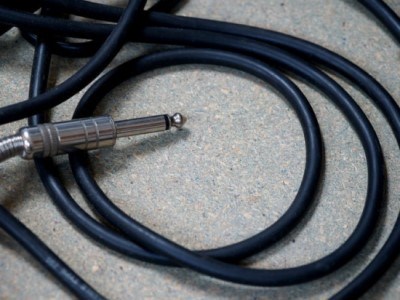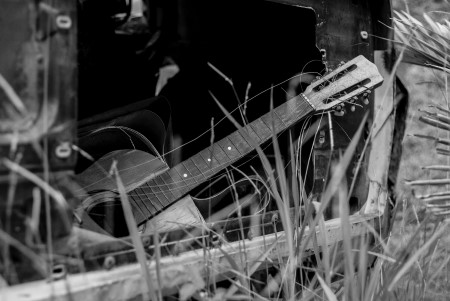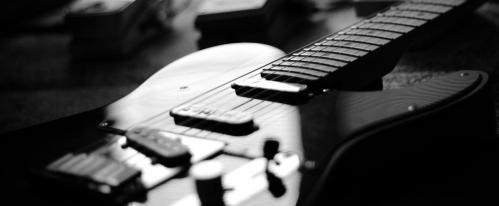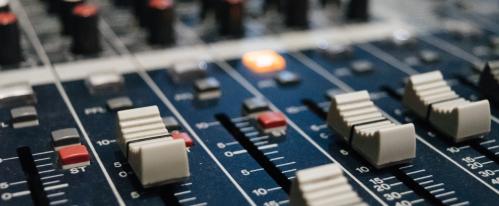Find out how to be a greener guitarist with our favourite eco-friendly tips for musicians on Earth Day
Today we’re going to celebrate Earth Day by looking at some simple ways to help the environment as a musician. As more and more bands make the pledge to commit to sustainable touring, we’ve come up with a list of things that musicians of all skill levels can do in order to help preserve the planet - and save themselves some money at the same time, too!
Check out this video and keep reading for our favourite tips for the environmentally-conscious guitar player..
In this blog we’ll be looking at the following ways to be an eco-friendly guitarist and musician:
- Clean Hands to Preserve Guitar Strings
- Re-Use Plectrums
- Fingerpick
- Coil Cables Properly
- Clean Your Gear
- Repair Not Replace
- Recycle Broken Gear
- Upcycle & Donate Gear
- Buy Used
- Consider Green Brands
- Stop Using Disposable Batteries
- Go Digital When Learning
- Take Public Transport to Gigs

Clean Hands to Preserve Guitar Strings
Extend the life of your guitar strings by making sure you clean your hands before you start shredding!
The life of guitar strings is shortened by grime and residue that is transferred from grubby hands, making your strings sound dull and lifeless. You can make them last a whole lot longer by playing your guitar with clean hands and then using a cloth to wipe the strings down after you’ve finished playing.
It’s a small change that can make a huge difference to how often you need to change your strings.
Reuse Plectrums
Plectrums can easily be reshaped and reused when they’re coming to the end of their life cycle.
Plectrums will often start to round-off over time and not be as easy to play with - but by simply cutting them back into shape you can extend their life and use less plastic in the long run.
Fingerpick
If you’re really serious about cutting down on your use of plastics then you can try to incorporate fingerstyle guitar into your playing techniques more often.
Iconic players such as Jeff Beck and Mark Knopfler don’t use plectrums, and it means you have one less thing to remember before every gig and rehearsal, too.
Coil Cables Properly
Not treating your cables with care and coiling them appropriately can lead to tangles and knots in the lead - both of which cause stresses along the length of the cable and can cause them to stop functioning over time.
By learning how to properly coil a cable you’re guaranteed a longer-lasting product, and you’ll save money on replacing gear too.

Clean Your Gear
By cleaning and taking care of your guitar, amp, and pedals, you’re much less likely to have to replace anything.
We’ve already mentioned how wiping down your strings after playing can help - but if you extend this to the rest of the guitar, by wiping sweat, dust and grime from the neck, hardware and electronics, you will stop the oils and acids from your skin and sweat from prematurely eating away at lacquered finishes and metal components.
In the same way, brushing away dust and dirt from the knobs and switches on your amp and pedals will help stop scratchy sounding pots, faulty switches and intermittent connections, again meaning that the components will last longer.
When it comes to cleaning your guitar, don’t use any harsh, solvent-based polishes, as these aren’t great for the environment and they’re also not that great for guitar finishes either.
You’ll be surprised how well a simple cloth slightly-dampened with warm water works to remove most gunk - and if you do use a guitar polish, you really don’t need to use that much to bring back that shine.
More natural products such as lemon oil are fantastic for rejuvenating and cleaning dry fingerboards, and a small squirt of isopropyl alcohol can be used to clean switches and pots as an alternative to aerosols which cause more harm to the environment.
Repair Not Replace
Even if you do take great care of your gear, things will eventually deteriorate and break down over time.
At this point however, it pays to learn how to repair things instead of replacing them.
A loose or intermittent jack socket on a guitar or amp doesn’t always need replacing and can often be cleaned and fixed with a bit of wire wool and then tightened using a pair of pliers.
Most of the time when a cable breaks it’s either a dry joint or severed jack connection which can easily be fixed with some basic soldering iron skills - or if there’s a break in the cable itself, which usually occurs at the place where you wrap it around the guitars strap button, you can try chopping off a couple of feet from the end with a pair of wire cutters and re-soldering the jack, leaving you with a totally useable, albeit slightly shorter cable.
Recycle Broken Gear
When gear is broken beyond repair, you should still look at how you can dispose of it in the most environmentally-conscious way.
Brands such as D’addario run recycling schemes for their used strings, for example, and most metal components from amps and pedals can be repurposed and reused.
Take some time to dispose of your broken gear properly and you’ll be doing the planet a favour.

Upcycle and Donate Gear
If you can’t figure out how to recycle your gear properly, you could always turn it into something else.
Guitar bodies can be used to make cool clocks for your practice room as an example, and there are plenty of artists who are willing to utilise old materials in order to create something bespoke and funky.
If your gear is still working, there are a range of charities and community groups who would probably love to get their hands on it.
A quick Google search will bring up a whole host of organisations that specialise in redistributing unwanted instruments to schools, community programs and students who can’t afford to buy a new instrument to learn on. So if you did want to get a few karma points in the bank it might be worth thinking about how much it’s worth to you if you were to sell it, compared to how much it might be worth to somebody that you donate it to.
Buy Used
At each and every PMT store we have a dazzling array of Pre-Loved gear that has been quality-checked and approved by our team of Experts.
You can take a look at the whole range here and make your next purchase one that the planet approves of:
Consider Green Brands and Products
If you are buying a brand new guitar however, take a look at some brands that are making strides to support the environment.
Leading guitar builders such as Taylor and Martin have long been committed to sourcing sustainable tonewoods and are involved with many reforestation initiatives around the globe.
The likes of Gibson, PRS and Fender have all re-evaluated the way they source their tonewoods to become greener manufacturers, and brands such as Faith guitars have partnered with the Just One Tree organisation to ensure that at least one tree is planted for every guitar sold globally.
Stop Using Disposable Batteries
Get a power brick for your pedalboard, and if you must use batteries in your active pickups or preamps, then opt for rechargeable options instead.
You’ll save yourself money in the long run and you’ll be taking a much greener approach. If you do have to use disposable batteries in a pinch, make sure you dispose and recycle of them properly.
Go Digital when Learning
Go digital when it comes to guitar tabs, sheet music or chord charts.
With the abundance of online lessons and tutorials available nowadays there’s really no need to be buying tablature books or printing off endless sheets of paper anymore, so save some trees by ditching the hardcopies and saving all your music digitally.
If you are a gigging musician there’s also lots of different phone and tablet stands that will discreetly clamp to a mic stand onstage so you can still easily read your music when you need to.
Take Public Transport to Gigs
If you’re a musician who plays live without too much of a heavy backline, then you should always consider getting to gigs in the most eco-friendly way possible.
Acoustic players and solo artists especially can consider travelling to shows via public transport, as it’s an easy way to avoid racking up your carbon footprint. Of course, some people still have to get large PA systems and amplifiers around, and if that’s the case then you should think about some of the other ways that you can offset your impact on the environment instead.
Check out the video at the top of this blog for a full list of ways you can help out!

Want to learn more about being an environmentally-conscious musician? Need some extra help with finding second-hand gear? Call us on 0151 448 2089 or check out your local store to speak to one of our Experts about your needs.




